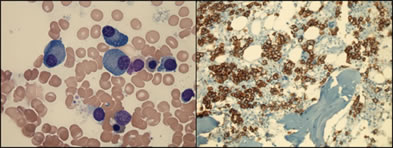Image Challenge: Hematology Consult - Middle-Age Man with Neuropathy and Splenomegaly
A 51-year-old male presented with shortness of breath and numbness and weakness in the lower extremities that had progressively worsened over the last three weeks and ultimately necessitated admission to the hospital. During physical examination, the patient presented with decreased breath sound at the bases of his lungs bilaterally and decreased sensation in both lower legs with a 17cm spleen. Diagnostic work-up revealed the patient had polyneuropathy by nerve conduction studies, hypothyroidism, monoclonal IgA M-protein (3g/dL), ascites, and bilateral pleural effusion. Serum free light chains analysis showed an abnormal elevation of Lamda light chains.
A bone marrow biopsy and aspiration was performed. The image on the left below shows cells (black arrows) that make up 38 percent of the cellularity of the aspiration. Immunohistochemical staining of the bone marrow core for CD138 is shown on the right.

Which serum lab test would you expect to be elevated in a patient with this syndrome?
- Prothrombin time
- Homocystine
- B12
- Folic acid
- VEGF
Answer
- VEGF
Explanation
The patient in the vignette has POEMS syndrome, which is a paraneoplastic syndrome related to an underlying plasma cell dyscrasia. The acronym stands for polyneuropathy, organomegaly, endocrinopathy, M-protein, and skin changes. To reach this diagnosis, patients must have both of the mandatory major criteria: polyradiculoneuropathy (usually demyelinating) and monoclonal plasma cell disorder (almost always λ). Patients must also have one of the other major criteria: Castleman's disease, sclerotic bone lesions, or serum VEGF elevation (greater than 200 pg/mL is 95% specific and 68% sensitive). One of the minor criteria is also required. Some of the minor criteria include organomegaly, extravascular volume overload, endocrinopathy, skin changes, thrombocytosis, or papilledema.
Resources
- Dispenzieri A. How I treat POEMS syndrome. Blood. 2012;119:5650-5658.
- D'Souza A, Hayman SR, Buadi F, et al. The utility of plasma vascular endothelial growth factor levels in the diagnosis and follow-up of patients with POEMS syndrome. Blood. 2011;118:4663-4665.